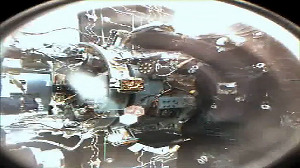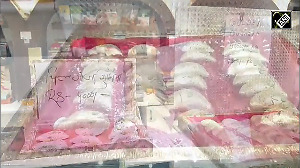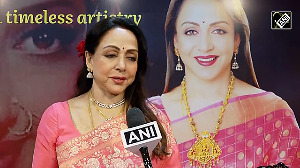"I hope that the government of Pakistan will take the ongoing actions against the terrorist groups to their logical conclusion. They should destroy these groups wherever they are operating and for whatever misguided purpose," he said at the inauguration of the Anantnag-Qazigund rail link.
Calling upon the people and the government of Pakistan to show their sincerity and good faith, he said, "As I have said many times before, we will not be found wanting in our response."
Sending a clear signal, Singh said it was a 'misplaced idea' that one could reach a compromise with the ideology of terrorists or that they can be used for one's own purpose.
"Eventually they turn against you and bring only death and destruction. The real face of the terrorists is clear for the people of Pakistan to see with their own eyes," he said.
He said India will press Pakistan to curb the activities of those elements that were engaging in terrorism in this country.
"If they are non-state actors, it is the solemn duty of the government of Pakistan to bring them to book, to destroy their camps and to eliminate their infrastructure," he said.
Singh said the perpetrators of the acts of terror must pay the heaviest penalty for their barbaric crimes against humanity.
PM said he strongly believed that the majority of the people in Pakistan sought good neighbourly and cooperative relations with India.
"They seek a permanent peace. This is our view as well," Singh said. On India extending a hand of friendship to Pakistan in 2004, the Prime Minister said the country's readiness to discuss all outstanding issues expressed then was not 'because of weakness but from a position of strength.'
"We had the most fruitful and productive discussions ever with the government of Pakistan during the period 2004-07 when militancy and violence began to decline. Intensive discussions were held on all issues including on a permanent resolution of the issue of Jammu and Kashmir," Singh said.
For the first time in 60 years, people were able to travel by road across the Line of Control. Divided families were re-united and trade between the two sides of Kashmir had begun. The overall trade with Pakistan had increased three-fold during 2004-07, Singh noted.
The number of visas issued to Pakistanis doubled during this period and an additional rail link was re-established, he said.
"These are not small achievements given the history of our troubled relationship with Pakistan. Inside the Valley, as militancy declined, trade, business and tourism began to pick up. We were moving in the right direction. For the first time there was a feeling among the people that a durable and final peace was around the corner," Singh said.
However, all the progress achieved was thwarted by acts of terrorism, Singh said.
"The terrorists want permanent enmity to prevail between the two countries. The terrorists have misused the name of a peaceful and benevolent religion. Their philosophy of hate has no place here. It is totally contrary to our centuries old tradition of tolerance and harmony among faiths," the Prime Minister said.
"Trade facilities at the border are inadequate. There are no banking channels. Customs facilities need to be strengthened. There are no trade fairs," he said adding that the lists of tradable commodities need to be increased.
"Clearances for travel take time. Prisoners of India and Pakistan are languishing in each other's jails even after completing their sentences," he lamented.
United Progressive Alliance chairperson Sonia Gandhi, who is also accompanying PM Singh, said that there are no issues that cannot be resolved through talks under principles of democracy
Earlier, Dr Manmohan Singh and UPA chief Sonia Gandhi arrived in Srinagar on Wednesday morning, where they were received by the Jammu and Kashmir Governor N N Vohra, state Chief Minister Omar Abdullah, senior state government, army and police officers.
Union railway minister Mamta Benerjee, Union health minister Ghulam Nabi Azad and New and Renewable energy minister Dr. Farooq Abdullah are accompanying the prime minister.
The state authorities have made elaborate security arrangements for the PM's visit.
The two factions of the separatist All Parties Hurriyat Conference have called for a strike on Wednesday to protest against the PM's visit.
Wednesday's strike shut shops, businesses in Srinagar and other towns. The entire road stretch from the tourist hub of Dalgate to Hazratbal has been blocked for any movement as the prime minister will be staying in the Cheshmashahi area of the city.
On Tuesday, the Valley observed a general strike called by separatists against the 62nd anniversary of the landing of Indian troops in the state.
With inputs from PTI






 © 2025
© 2025